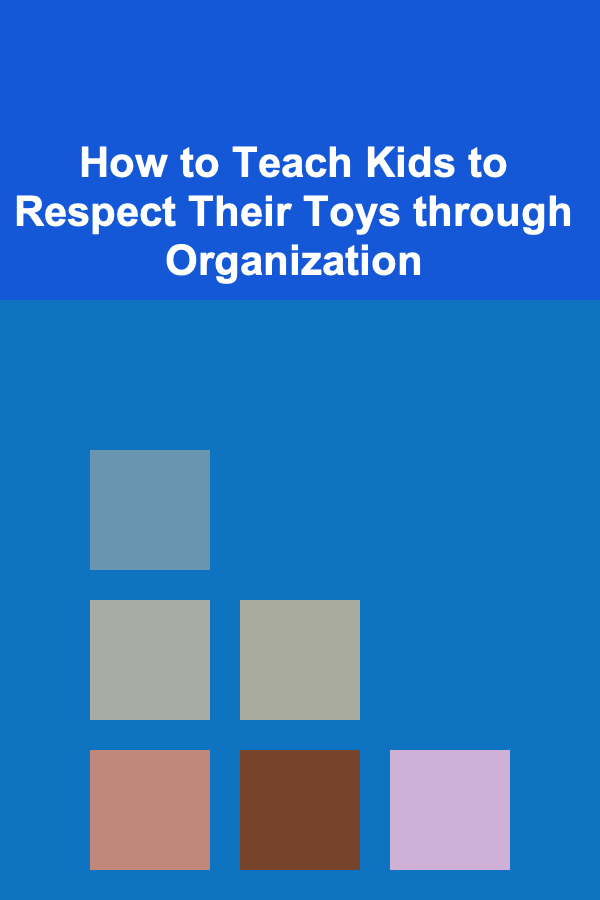
How to Teach Kids to Respect Their Toys through Organization
ebook include PDF & Audio bundle (Micro Guide)
$12.99$10.99
Limited Time Offer! Order within the next:

Teaching children to respect their toys goes beyond simply instructing them to pick up after themselves. It involves instilling values of responsibility, mindfulness, and appreciation for their belongings. One effective method to cultivate this respect is through organization. A well-organized space not only reduces clutter but also fosters a deeper connection between children and their toys. This article explores various strategies and practices to teach kids the importance of respecting their toys through effective organization.
Understanding the Importance of Respecting Toys
1.1. Emotional Connection
Children often form emotional attachments to their toys. These items can represent comfort, joy, and companionship. Teaching kids to respect their toys helps them understand that these objects have value and significance.
1.2. Responsibility and Ownership
When children learn to care for their toys, they develop a sense of responsibility. This sense of ownership extends beyond toys and can influence how they treat other possessions and responsibilities in life.
1.3. Mindfulness and Appreciation
Organized spaces encourage mindful play. When children can easily access and see their toys, they are more likely to appreciate what they have and engage with their toys meaningfully.
1.4. Reducing Clutter
A cluttered environment can lead to frustration and anxiety, both for children and parents. Teaching kids to organize their toys helps create a calming atmosphere conducive to play and creativity.
The Role of Organization in Respecting Toys
Organization serves as the backbone of teaching children to respect their toys. A structured approach to organization allows kids to understand where their toys belong, making it easier for them to take care of their belongings.
2.1. Creating a Designated Play Area
Establishing a specific area for play can help delineate spaces for toys and activities. This area should be inviting and accessible, encouraging children to engage with their toys while keeping the rest of the home tidy.
2.2. Using Storage Solutions
Effective storage solutions are essential for organizing toys. Various options, such as bins, baskets, shelves, and drawers, can be integrated into the play area. These solutions provide children with designated spaces for their toys, promoting responsibility.
2.3. Implementing a Systematic Approach
A clear, systematic approach to organization helps children understand the process of tidying up. Teaching them about sorting, categorizing, and labeling toys can make the organization feel less daunting and more manageable.
2.4. Regular Maintenance
Maintaining an organized toy collection is crucial. Setting aside regular times for decluttering and reorganizing can reinforce the importance of respect and care for toys.
Steps to Teach Kids to Respect Their Toys through Organization
3.1. Involve Children in the Organization Process
Engagement and Empowerment
Involving children in the organization process empowers them and promotes ownership over their toys. Here's how to do it:
- Discuss the Plan: Sit down with your child and explain why organization matters. Use simple language and relate it to their experiences.
- Create a Fun Activity: Turn the organization process into a fun activity. For instance, make it a game or a challenge to see how quickly they can sort their toys.
3.2. Categorize Toys
Sorting Toys by Type
Help your child categorize their toys. This could involve sorting them into different groups, such as:
- Building Toys: Blocks, construction sets, etc.
- Art Supplies: Crayons, markers, paper, etc.
- Stuffed Animals: Plush toys, dolls, etc.
- Outdoor Toys: Balls, frisbees, etc.
Benefits of Categorization
Categorizing toys makes it easier for children to find what they want to play with. It also simplifies the process of putting things away.
3.3. Labeling Storage Containers
Using Labels for Organization
Labeling storage containers can significantly enhance organization. Here's how to implement this:
- Create Visual Labels: Use pictures alongside words for younger children who may not be able to read yet.
- Encourage Participation: Allow your child to help create and decorate the labels. This involvement fosters a sense of ownership.
3.4. Demonstrate the Cleaning Process
Modeling Behavior
Show children how to clean up after playing. Here's a step-by-step approach:
- Set a Timer: Make cleaning up a game by timing how quickly they can put everything away.
- Lead by Example: Demonstrate how to tidy up one category at a time, showing them the process.
- Use Positive Reinforcement: Praise them when they successfully clean up their toys, reinforcing the behavior you want to see.
3.5. Create a Routine
Establishing Daily Cleaning Habits
Integrating organization into daily routines helps children internalize the importance of respecting their toys. Here's how to establish a routine:
- Daily Clean-Up Times: Set aside specific times each day for toy organization, such as before dinner or bedtime.
- Incorporate into Playtime: Encourage children to clean up before transitioning to a new activity. This creates a natural rhythm of organization.
Encouraging Mindful Play
4.1. Limit the Number of Toys
Quality Over Quantity
Encouraging children to focus on fewer toys increases their appreciation for what they have. Here's how to implement this:
- Curate a Selection: Periodically review the toy collection and remove items that are seldom used or no longer loved.
- Encourage Thoughtful Purchases: When considering new toys, discuss their potential value and how they fit into the existing collection.
4.2. Promote Open-Ended Play
Fostering Creativity
Open-ended toys that can be used in multiple ways encourage creativity and critical thinking. Examples include:
- Building Blocks: Allowing for endless possibilities in construction and design.
- Art Supplies: Encouraging personal expression and creativity.
4.3. Reduce Distractions
Creating a Focused Play Environment
Minimizing distractions in the play area can enhance mindfulness. Here's how:
- Limit Screen Time: Encourage play without screens to foster creativity and imagination.
- Designate Play Zones: Create specific areas for different types of play (e.g., reading nook, arts and crafts corner).
Teaching Kids About Value and Care
5.1. Discussing the Cost of Toys
Understanding Financial Responsibility
Teach children about the value of money and the cost associated with toys:
- Simple Conversations: Discuss how much a toy costs and the effort it takes to earn that money.
- Emphasize Value: Help them understand that taking care of toys prolongs their life and usefulness.
5.2. Introducing Repair Skills
Teaching Repair and Maintenance
Encouraging children to repair rather than discard broken toys teaches valuable life skills. Here's how:
- Basic Repairs: Show them how to fix simple issues, such as sewing a stuffed animal or reattaching a piece of a game.
- Encourage Creativity: Promote the idea of repurposing or upcycling broken toys into something new.
Benefits of Organizational Skills Beyond Toys
6.1. Life Skills Development
Developing organizational skills at a young age prepares children for future success. The skills learned through organizing toys can translate to other areas of life, including:
- Schoolwork: Keeping school supplies organized fosters better study habits.
- Chores: Understanding organization can ease responsibilities around the home.
6.2. Building Confidence
Successfully managing their toys instills a sense of accomplishment in children. This confidence can extend to other areas, encouraging them to tackle challenges with a positive mindset.
6.3. Enhancing Focus and Concentration
An organized environment promotes focus and concentration. Children can engage in meaningful play, leading to deeper learning experiences.
Conclusion
Teaching kids to respect their toys through organization is a multifaceted process that involves emotional connection, responsibility, mindfulness, and ongoing maintenance. By creating designated play areas, implementing effective storage solutions, and involving children in the organization process, parents can instill lifelong values that extend beyond toys.
As children learn to appreciate and care for their belongings, they develop essential life skills that prepare them for future challenges. Through regular routines, discussions about value, and encouragement of mindful play, we can empower the next generation to cultivate respect for their possessions and foster a balanced, organized lifestyle.
By embracing these principles, families can create a home environment that nurtures creativity, responsibility, and emotional well-being, ultimately leading to happier, more engaged children.
Reading More From Our Other Websites
- [Organization Tip 101] How to Organize Emergency Kits for Outdoor Adventures
- [Organization Tip 101] How to Use Colorful Sticky Notes to Organize Tasks
- [Personal Care Tips 101] How to Use Makeup Remover for Long-Lasting Cleanliness
- [Home Cleaning 101] How to Deep Clean Your Outdoor Furniture
- [Home Pet Care 101] Pet First Aid at Home: What Every Pet Owner Should Know
- [Personal Investment 101] Making Money from Deep Learning: The Ultimate Guide
- [Personal Finance Management 101] How to Turn Your Kids into Money-Smart Superstars: Financial Education for Kids at Every Age
- [Home Maintenance 101] How to Perform Basic Roof Repair and When to Call a Pro
- [Organization Tip 101] How to Create a Low Vision-Friendly Environment with the Right Lighting
- [Gardening 101] A Step‑by‑Step Guide to Beginner Gardening: From Soil to Harvest

How to Post Content on LinkedIn to Attract B2B Dropshipping Partners
Read More
How to Start a Family Journal for Documenting Daily Life and Adventures
Read More
How to Update Your Home's Look with Minimalist Decor on a Budget
Read More
How to Use Your Appliance Warranty Effectively
Read More
What Are the Best Ways to Keep Your Home Office Clutter-Free?
Read More
How to Create a Printable Family Tree for Beginners
Read MoreOther Products

How to Post Content on LinkedIn to Attract B2B Dropshipping Partners
Read More
How to Start a Family Journal for Documenting Daily Life and Adventures
Read More
How to Update Your Home's Look with Minimalist Decor on a Budget
Read More
How to Use Your Appliance Warranty Effectively
Read More
What Are the Best Ways to Keep Your Home Office Clutter-Free?
Read More